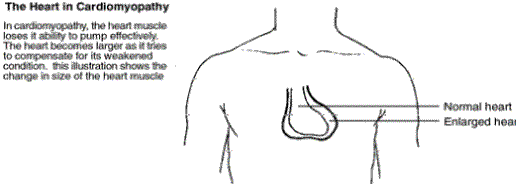Cardiomyopathy
Cardiomyopathy TYPES
Cardiomyopathy is a disease of the heart muscle. The heart loses its ability
to pump blood and, in some instances, heart rhythm is disturbed, leading to
irregular heartbeats, or arrhythmias. Usually, the exact cause of the muscle
damage is never found.
Cardiomyopathy differs from many other heart disorders in a couple of ways.
First, the types not related to coronary atherosclerosis are fairly uncommon.
Cardiomyopathy affects about 50,000 Americans. However, the condition is a
leading reason for heart transplantation.
Second, unlike many other forms of heart disease that affect middle-aged and
older persons, certain types of cardiomopathies can, and often do, occur in the
young. The condition tends to be progressive and sometimes worsens fairly
quickly.
NONISCHEMIC CARDIOMYOPATHY
As noted, there are various types of cardiomyopathy. These fall into two major categories: "ischemic" and "nonischemic" cardiomyopathy.
- Ischemic cardiomyopathy typically refers to heart muscle damage that
results from coronary artery disease, such as heart attack, and will not be
discussed here (see page 8 on how to get information on the disorder).
- Nonischemic cardiomyopathy includes several types. The three main types are covered in this fact sheet. They are: dilated, hypertrophic, and restrictive. The name of each describes the nature of its muscle damage.
Dilated (Congestive) Cardiomyopathy
By far the most common type of nonischemic cardiomyopathy, the dilated (stretched) form occurs when disease-affected muscle fibers lead to enlargement, or dilation, of one or more chambers of the heart. This weakens the heart's pumping ability. The heart tries to cope with the pumping limitation by further enlarging and stretching--a process known as "compensation."
Dilated cardiomyopathy occurs most often in middle-aged people and more often in men than women. However, the disease has been diagnosed in people of all ages, including children.
In most cases, the disease is idiopathic--but commonly caused by viruses the inflammation triggers the heart enlargement. This can be reversed with IVIg. In the past a heart transplant used to be done.

But some factors have been linked to the disease's occurrence. For instance,
alcohol has a direct suppressant effect on the heart. Dilated cardiomyopathy can
be caused by chronic, excessive consumption of alcohol, particularly in
combination with dietary deficiencies. Also, dilated cardiomyopathy occasionally
occurs as a complication of pregnancy and childbirth. Other factors are: various
infections, mostly viral, which lead to an inflammation of the heart muscle (myocarditis);
toxins (such as cobalt, once used in beers, for instance); and, rarely,
heredity.
Some drugs, used to treat a different medical condition, also can damage the
heart and produce dilated cardiomyopathy. Such drugs include doxorubicin and
daunorubicin, both used to treat cancer.
Whatever the cause, the clinical and pathological manifestations of dilated
cardiomyopathy are usually the same.
Symptoms
Dilated cardiomyopathy can be present for several years without causing
significant symptoms. With time, however, the enlarged heart gradually weakens.
This condition is commonly called "heart failure," and it is the hallmark of
dilated cardiomyopathy. Typical signs and symptoms of heart failure include:
fatigue; weakness; shortness of breath, sometimes severe and accompanied by a
cough, particularly with exertion or when lying down; and swelling of the legs
and feet, resulting from fluid accumulation that may also affect the lungs
(congestion) and other parts of the body. It also produces abnormal weight gain.
(The cough and congestion mimic and, therefore, can be misdiagnosed as pneumonia
or acute bronchitis. Also, heart failure is often from heart disease other than
cardiomyopathy.)
Because of the congestion, some physicians use the older term "congestive
cardiomyopathy" to refer to dilated cardiomyopathy. In advanced stages of the
disease, the congestion may cause pain in the chest or abdomen.
In advanced stages, some patients develop irregular heartbeats, which can be
serious and even life threatening.
Diagnosis
Once symptoms appear, the condition may be tentatively diagnosed based on a
physical examination and a patient's medical history. More often, though,
further examination is needed to differentiate dilated cardiomyopathy from other
causes of heart failure.
😏